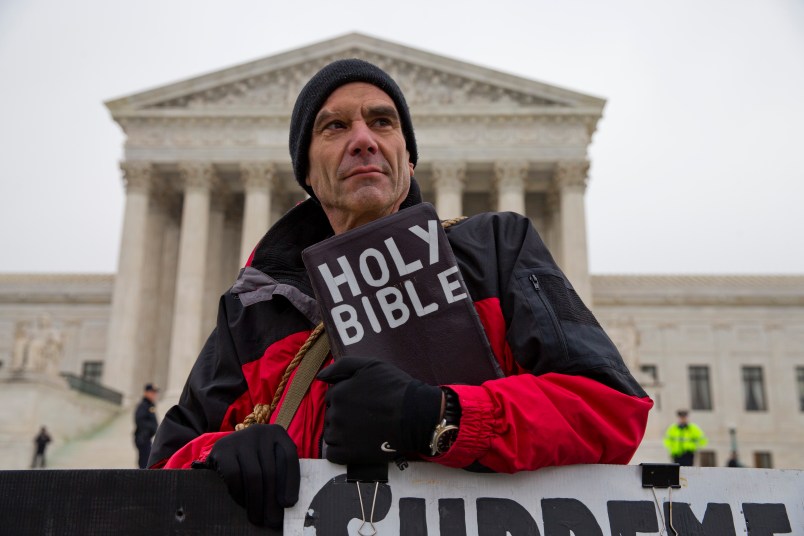The Supreme Court may have signaled a broadening of its Hobby Lobby ruling on Thursday afternoon while Americans were leaving work for the July 4 holiday weekend, legal experts say.
The justices granted an emergency injunction saying Wheaton College, an evangelical institution, need not fill out the government Form 700 to opt out of the contraceptive coverage requirement and can simply inform the Obama administration of its intentions while its lawsuit is pending in the courts. Wheaton — and 121 other religious nonprofits — say the form violates their religious freedom because it makes them complicit in the sin of covering birth control.
The injunction order divided the Court along gender lines, drawing a blistering dissent in which the three female justices accused their male colleagues of disregarding their own precedent from just days earlier in Hobby Lobby and “undermin[ing] confidence in this institution.”
“Those who are bound by our decisions usually believe they can take us at our word. Not so today,” Justice Sonia Sotomayor wrote. “After expressly relying on the availability of the religious-nonprofit accommodation to hold that the contraceptive coverage requirement violates RFRA as applied to closely held for-profit corporations, the Court now, as the dissent in Hobby Lobby feared it might … retreats from that position.”
In the Hobby Lobby ruling, the five Republican-appointed justices said for-profit corporations may opt out of the contraception mandate if their owners object to it on religious grounds. The majority instead proposed an alternative, saying the Obama administration could achieve its goal in a less restrictive way by extending the nonprofit accommodation to objecting for-profit companies. That suggested to some that the accommodation rule did not meet the high standard typically required for an emergency injunction.
“The Wheaton College decision seems to contradict directly the Hobby Lobby decision the Court had entered three days earlier. The Court offered virtually no justification for its change of position,” Tim Jost, a law professor at Washington and Lee School of Law, wrote at Health Affairs. He concluded that “if the Supreme Court is to retain its legitimacy, it must try harder to observe its own precedents and to explain when it varies from or modifies those precedents. It has singularly failed to do so in this case.”
In the injunction order, the justices made clear they weren’t deciding the merits of the nonprofit case, which is pending in lower courts. They said the government can facilitate coverage of the contraceptives listed under Obamacare’s preventive services package to employees even if their bosses don’t fill out the official form. Form 700 was the result of a painstaking administrative rule-making effort to ensure that religious liberties and legal obligations were fulfilled.
Marty Lederman, a professor at Georgetown Law, wondered if the Supreme Court’s injunction order was based on a “misunderstanding” of the legal problem at hand. He raised the question of whether the contraceptive coverage could be facilitated if Wheaton is permitted to opt out of the government procedure.
At SCOTUSblog, attorney Tom Goldstein tried to make sense of the Court’s move.
“As I read the Court’s opinions, it has concluded that the difference is material in terms of the entity’s religious objections, but is not material in terms of whether the coverage is available. That’s why it didn’t accept either the government’s position or Wheaton’s, but instead a middle ground,” he wrote. “The Court in essence responds, ‘Why are you complaining so much that Wheaton is going to fill out one piece of paper rather than another?'”
Less surprising but nevertheless notable was the justices’ decision last Tuesday to order lower courts to hear numerous for-profit business’ challenges to coverage of all forms of birth control, including the ones that lost prior to Hobby Lobby. The nonprofit challenges are expected to eventually be settled by the Supreme Court.







These rulings by the old boys seem impeachable. Can someone clarify for me what’s the deal there?
This is Kochtastic.
-The Koch brothers
Activist judges are re-writing the law in their gods image
They’re doing a judicial “executive action” to “clarify” the ruling…and in the execution of that order, they have expanded the “narrow ruling” of the Hobby Lobby decision to encompass ALL TWENTY forms of birth control. Narrow ruling, my ass.
I’m beginning to wonder if the Five Supremes, two of whom have direct ties to the Kochs, are not deliberately undermining confidence in the Supreme Court and the other two branches as a general assault on the legitimacy of the federal government.
Sad to say, but treason seems a more believable motive than legal stupidity on their parts.